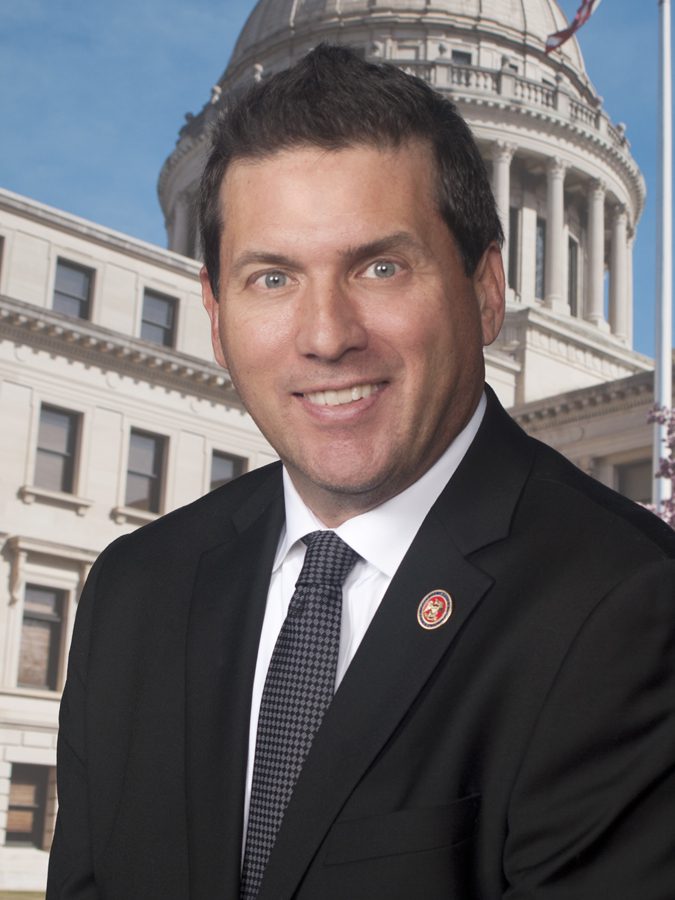
Mississippi House of Representatives chamber, Monday, Feb. 26, 2024, at the state Capitol in Jackson, Miss. (AP Photo/Rogelio V. Solis)
- With support from the Mississippi State Department of Health and Department of Mental Health, psychiatric residential services, drug rehab, and birthing centers could be removed from CON laws.
Efforts to change specific Certificate of Need (CON) laws in Mississippi continue to remain in play after the first major committee deadline of the 2024 legislative session.

A bill from State Representative Lee Yancey (R) is one that made the cut.
HB 848 directly addresses CON regulations on chemical dependency service and facilities, affiliated care facilities, facilities for individuals with intellectual disabilities, psychiatric residential treatment facilities, and birthing centers.
Yancey said the legislation was modeled on recommendations from the Mississippi State Department of Health, that agency that oversees CON application approval, with input from the Department of Mental Health.
“The CON subcommittee of their board met in January and recommended that we address psychiatric residential services, alcohol and drug rehab services, and perinatal services,” said Yancey. “My bill mirrors that.”
Rep. Yancey attributed the passage of the bill out of committee to the support of both agencies. He said this is the first real chance lawmakers have had to remove what he called “strangling” regulations when attempting to expand healthcare access in the state.
As for the real-world application, Yancey said the legislation could impact psychiatric patients who are awaiting acceptance into a treatment facility while incarcerated, moving them out of a prison and into a facility that can provide the services they need.
In the past, CON bills have often died early in the legislative process due to push back from hospitals and lobbyists that oppose changes to the regulations.
RELATED: Questions surround Certificate of Need laws and their impact on Mississippi healthcare
Another bill Rep. Yancey is championing this year attempts to change the words “mentally retarded” to “intellectually disabled” in state statute, a move that sparked debate because it opened code sections pertaining to CON.
“There was a fear that if we open those code sections that legislators would try to pile in with amendments and get an exemption for the CON law for their area,” said Yancey. “There has just been such a fear of competition in healthcare or protecting the status quo.”
Rep. Yancey said that fear of competition has been the biggest challenge for lawmakers trying to make reforms to the CON regulations. He said support from the Departments of Health and Mental Health have given strength to lawmaker’s efforts to pass this type of legislation.
Where does MSDH stand on CON?
State Health Officer Dr. Daniel Edney spoke recently after the release of the Health Management Associates (HMA) report which did a deep dive into CON laws and how Mississippi compares to neighboring states regarding those regulations.

The report indicated that the department has a high approval rate for CON applications and sustained rulings when rejected since as far back as 2013.
In 2022, MSDH had a 94% approval rate, only denying one application and approving 18, the most in the last six years.
The report results found that strengths of the CON program limit profiteering and oversupply, while ensuring more equitable distribution of services. However, weaknesses in the process exist, with data used being outdated and unreliable indicating that the formulas need to be revised while more consideration for performance and quality should be considered.
Key differences found when comparing Mississippi’s CON requirements regarding regulatory framework and how other states operate pointed out that while the Magnolia State has a threshold requirement for equipment, clinical, and non-clinical requests, most other states do not.
Arkansas and Louisiana do not require a CON for hospitals, but Mississippi does.
Other states also require CON for hospice and adult/pediatric day centers. Mississippi is rare in the South in that it publishes approvals online, whereas Alabama, Arkansas, Louisiana and Tennessee do not.
Mississippi bases CON approval on population ratios and projections, while Alabama uses a utilization model and Arkansas sets a population level at or under 50,000 for services allowed.
In continued conversations with lawmakers, Dr. Edney said the department endorsed waiver exemptions for the services included in Rep. Yancey’s bill. Edney said it is MSDH’s belief that removing CON regulations on these entities is a very low risk.
“We’ve been very clear, CON, it has its place, but often it does get in the way of healthcare investment. CON, as we must administer it, is allowing folks to block other investors in inappropriate ways and adds more costs to the program and more time,” Dr. Edney told the Magnolia Tribune. “It’s frustrating to have areas of the state in desperate need of investment and local entities ready to make it, but by statute they have to go through the CON process.”
Edney said that the current strategy is to look at low risk, high need areas and remove those CON restrictions, determining what the impact will be. He expressed disagreement with attempts to dismantle CON across the board, noting the potential negative impact it could have on rural hospitals.
While the bill would remove CON requirements for facilities such as a birthing center, licensure for operations would still run through MSDH.
Currently, the CON process is overseen within MSDH. A specific section in the department reviews the applications and applies required data in order to reach a determination on approval. Those involved then make the recommendation to Dr. Edney. If an objection is made, a hearing must occur which is overseen by an appointed officer from the Attorney General’s office.
Appeals are possible, but Edney said for many that can lengthen the process up to two years. In the last 10 years no determination by MSDH has been overturned in court.
Dr. Edney said if Yancey’s legislation has a positive impact on the service areas it will impact, he foresees additional CON removal efforts moving forward. Edney pointed to primary care and how he found it unreasonable for those entities to be subject to CON approval.
“The Board of Health is extremely concerned with CON being the best that it can be at the agency level and also in terms of the whole program and policy in Mississippi,” said Dr. Edney.
Other legislation to address Certificate of Need have been offered by State Rep. Hank Zuber (R) and State Senator Kevin Blackwell (R). Zuber’s legislation opens the code sections for any possible amendments to CON while Blackwell’s measure addresses a specific psychiatric facility in DeSoto County as well as the hearing process after an application is submitted.
You can read the full HMA report below:










